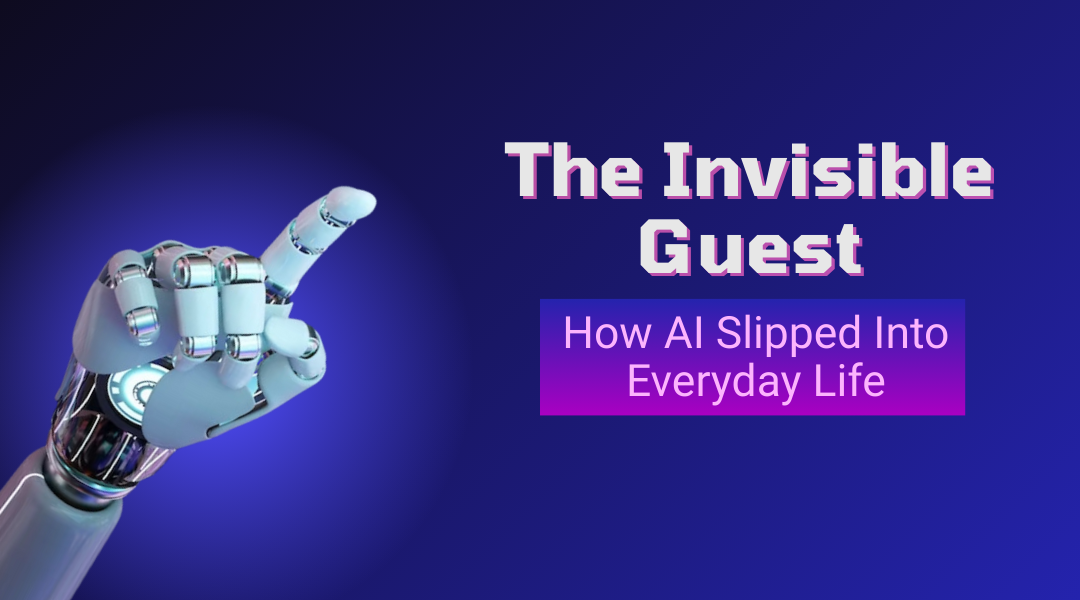It often begins innocently.
You say, “Hey Siri, set an alarm for 6 a.m.” or “Alexa, play my daughter’s bedtime playlist.”
The lights dim, the music starts, and you marvel at how smooth and effortless it feels.
What you don’t see is the invisible exchange taking place. Every command you give, every request you make, becomes another line in the massive data diaries that artificial intelligence systems keep. Over time, these systems don’t just respond to you—they anticipate you.
That’s the quiet revolution of AI: it didn’t burst into our lives with robots walking the streets. It slid in through convenience, disguised as helpful tools.
A Career Upended Overnight
Take the story of Priya, a marketing professional in Bengaluru. For years, she balanced spreadsheets, crafted campaigns, and worked late perfecting copy. On Monday morning, she walked into the office to find her role had “evolved.”
Her company had adopted an AI platform that handled everything from social media scheduling to customer data analysis. Overnight, half her department was “restructured.” Priya went from leading campaigns to rewriting her CV.
She’s not alone. In 2023, global giants like Intel, Meta, and Amazon cut tens of thousands of jobs, citing “AI-driven efficiency.” And the wave isn’t slowing. A 2024 McKinsey report estimates that by 2030, nearly a third of routine office tasks could be automated. That doesn’t just affect warehouse staff or call center operators—it reaches accountants, marketers, and analysts, too.
Why We Didn’t Notice
AI didn’t announce itself. It crept in through design choices meant to feel seamless.
Think about your last Netflix binge. You promised yourself one episode, but three hours later you’re still glued to the screen. That’s not an accident—it’s the recommendation engine, quietly tailoring your experience, nudging you to keep watching.
Or your online shopping habits: you check Amazon for a new toaster, and within seconds, you’re bombarded with suggestions—bread knives, toaster covers, fancy jams. It feels intuitive, but behind the scenes, algorithms are crunching millions of purchase histories to predict your next click.
And in China’s manufacturing hubs like Shenzhen, AI doesn’t hide at all. Factories are staffed by rows of robotic arms, while humans watch from control rooms. Even in public spaces, facial-recognition cameras track millions of faces daily, feeding massive surveillance networks.
What connects these dots is how easily AI became background noise. It made life smoother, cheaper, faster—and we didn’t ask many questions.
The Price of Convenience
Convenience is seductive. When your fridge suggests a grocery list or your navigation app reroutes you around traffic, it feels like technology is working for you. But every shortcut has a hidden cost.
Consider Ramesh, a taxi driver in Mumbai. At first, Uber’s app boosted his business. Then the algorithm shifted. Drivers with newer cars, higher ratings, and optimized routes got more rides. Ramesh’s years of experience weaving through Mumbai’s chaos suddenly counted for less than an algorithm’s score. Within months, his earnings dropped 40%.
Even at home, smart devices are constantly listening. Voice assistants don’t just hear your commands—they capture snippets of conversation, storing them for “improvement.” That’s data you never consciously agreed to trade, but it fuels the very systems you rely on.
Subtle Ways You’re Being Nudged
AI’s influence isn’t always dramatic—it often works in the background, shaping choices you think are your own.
- Pricing games: Ever notice how flight tickets jump when you check them twice? Or how Uber fares double when it rains? That’s dynamic pricing at work, algorithms adjusting in real-time to what they think you’ll pay.
- Social media bubbles: Click one political video and suddenly your feed fills with similar takes. Over weeks, your online world narrows, echoing back the same opinions until they feel like the only truth.
- Everyday services: Airlines use chatbots to rebook tickets. Hospitals deploy AI to scan X-rays before doctors see them. Even customer complaints are filtered by algorithms before reaching a human.
Sometimes these systems get it right. Other times, they miss entirely—flagging harmless content as harmful or offering wrong diagnoses. But by then, the AI has already shaped your path.
What Tomorrow Might Look Like
We’re only scratching the surface of what’s coming.
In Tokyo, banks already use AI-powered call systems that can schedule appointments and resolve routine queries—without a single human on the line. By next year, many call centers may operate almost entirely without people.
In U.S. hospitals, AI already reviews patient scans. Doctors are still in the loop, but the first “opinion” often comes from a machine.
And then there’s the darker side: deepfakes used in political campaigns, AI-generated voices that impersonate real people, and content moderation that silences harmless voices while letting dangerous misinformation slip through.
Staying Awake in an AI World
So what can you do? You can’t stop AI from advancing, but you can choose how you engage with it.
- Be intentional with your apps. Ask: does this make my life easier, or does it take decisions away from me?
- Question what you see online. Is that video real, or could it be generated? Why is this post showing up in your feed?
- Know your trade-offs. When you let a device track your location or preferences, ask: what am I giving away, and is it worth it?
Conclusion: Awareness Is Power
AI didn’t storm into our lives—it tiptoed in through playlists, shopping carts, and streaming queues. And while it often feels friendly, even invisible, it’s shaping decisions we don’t even realize we’re making.
The challenge isn’t to avoid AI altogether—it’s to stay awake to its influence. By questioning the apps we use, the prices we pay, and the feeds we scroll, we reclaim some control in a world where algorithms increasingly set the rules.
Once you notice how AI has threaded itself into your day, you can’t unsee it. And that awareness—more than any gadget or app—is the first step to navigating the future on your own terms.
